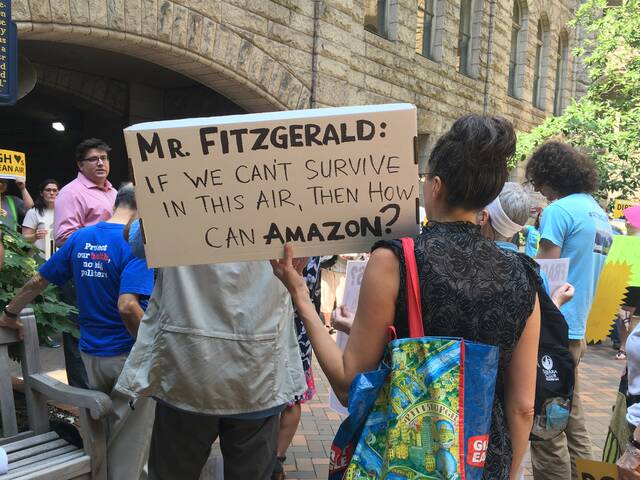https://naviga.triblive.com/opinion/ashleigh-deemer-environmental-priorities-for-allegheny-county-executives-first-100-days/
Ashleigh Deemer: Environmental priorities for Allegheny County executive’s first 100 days

Allegheny County will soon start a new chapter with the election of its first new county executive in more than a dozen years. It will be a big change and a new opportunity to prioritize environmental protection and public health in Allegheny County government. That’s why, earlier this year, the PennEnvironment Research & Policy Center released the Green Allegheny Issue & Policy Agenda, a blueprint of local policy priorities compiled by the region’s leading environmental advocates and experts. Nearly 25 local nonprofit organizations, community leaders and elected officials endorsed this agenda, delivering a unified message about the need to protect Allegheny County’s air, water, climate and natural places.
No matter the outcome of the election, starting a new administration is complicated and the new county executive will face many complex challenges in their first months on the job. That’s why PennEnvironment suggests two key commitments the county executive can easily make within their first hundred days in office to improve our environment and residents’ quality of life.
First and foremost, we must begin to address air pollution. To do that, Allegheny County needs to eliminate the backlog of expired and nonexistent permits for Allegheny County’s major air polluters.
Our air consistently ranks as some of the most polluted in the country, and this pollution is linked to diseases impacting people in our region, including heart problems, asthma and cancer.
More than 80% of the toxic industrial air pollution reported in Allegheny County in 2021 came from just 10 facilities, all of which are subject to the federal Clean Air Act. The Allegheny County Health Department enforces the Clean Air Act locally, and they are required to issue permits that outline pollution control measures, limits and other requirements to 29 local major air polluters. And yet three of these 29 facilities have never had the required permits, and 11 others have expired or soon-to-be-expired permits. To ratchet down pollution from these facilities, the next county executive must commit to issuing current permits for the facilities that need them, and those permits should include pollution limits and pollution control requirements designed to improve health outcomes for local residents.
Another environmental issue impacting local residents’ health is climate change, which has inflamed increasingly extreme rainfalls and ensuing flash floods, as well as dangerous heat waves. The Union of Concerned Scientists predicts that if we don’t slow the pace of climate change, by 2050, Allegheny County will experience 55 days a year with a heat index above 90 degrees. This type of extreme heat is a top cause of weather-related deaths.
According to the U.S. Environmental Protection Agency, the transportation sector is now the largest contributor to global warming pollution. To make the county a climate leader and do our part to reduce global warming pollution, the next executive should commit to electrifying the county’s entire light duty vehicle fleet by 2030.
Electric vehicles can now travel many hundreds of miles on one charge, and they’re far more energy efficient than a fossil fuel-powered vehicle. In fact, local governments that replace their gas- and diesel-powered light-duty vehicles with electric ones can reduce global warming pollution from their fleets by 63%, with even greater savings likely as clean forms of electricity increasingly dominate our power grid. As of 2022, only 15 of the 798 vehicles in Allegheny County’s fleet were electric.
By committing to electrifying the county’s light duty fleet, the next county executive can meaningfully reduce climate pollution and be a leader on this important issue.
Air pollution and climate change are just two of the big and varied challenges Allegheny County’s next executive will face on Day 1. That’s why committing to clean up our air and protect our climate in their first 100 days is so essential.
Setting these processes in motion will put some early wins on the board, and free up space to take on more of the recommendations in the Green Allegheny Issue & Policy Agenda.
With decisive action from the county executive, we can protect our beloved Three Rivers from pollution, reduce unnecessary plastic waste, enhance our parks and make our lives better. You can read all 50 policy recommendations in the Green Allegheny Issue & Policy Agenda on PennEnvironment Research & Policy Center’s website.
Ashleigh Deemer is deputy director of PennEnvironment.
Copyright ©2026— Trib Total Media, LLC (TribLIVE.com)
